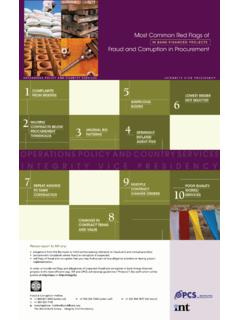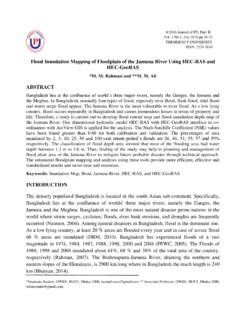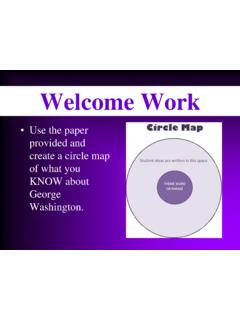Transcription of The Presidency in Action - mskenneyss.weebly.com
1 CHAPTER 14. The Presidency in Action ''The President hears a hundred Presidents today do have great power-to carry out laws, voices telling him that he is the make policies, choose officials, command the military, greatest man in the world. He must and conduct foreign affairs. The Framers gave the listen carefully indeed to hear the President certain "executive powers," which have grown one voice that tells him he is not. ' ' greatly over time. How much power a President actually -Harry S Truman (1964) exercises depends on the person and on the times. Standards Preview H-SS Describe the systems of separated and shared powers, the role of organized interests (Federalist Paper Number 10), checks and balances (Federalist Paper Number 51) , the importance of an independent SECTION 1. judiciary (Federalist Paper Number 78), enumerated powers, rule of law, federalism , and civilian control of the military.
2 The Growth of Presidential Power H-SS Discuss Article II of the Constitution as it relates to the (pp. 39G-392). executive branch, including eligibility for office and length of term, election to and removal from office, the oath of office, and the enumerated execu- * Article II of the Constitution created the Presidency and gives tive powers. the President certain expressed powers. H-SS Explain the processes of selection and confirmation of ~Article II is remarkably brief, leaving Americans to debate Supreme Court justices. whether the Framers intended the Presidency to be relatively H-SS .5 Explain how public policy is formed, including the setting strong or weak. of the public agenda and implementation of it through regulations and executive orders. * Since the nation's founding, the power of the Presidency has H-SS .8 Understand the scope of presidential power and decision grown significantly.
3 Making through examination of case studies such as the Cuban Missile * The power a President exercises depends on his views about Crisis, passage of Great Society legislation, War Powers Act, Gulf War, the office and how he interprets Article II. and Bosnia. The President's Executive Powers (pp. 393-397). * Article II gives the President the power and responsibility to "execute the laws.". * This executive power gives the President a great deal of flexibility in deciding how laws are carried out. * Among the President's key powers are those to appoint and remove top federal officials. SECTION 3. Diplomatic and Military Powers (pp. 399--403). * The President shares treaty-making and other powers with Congress. * Certain diplomatic powers may be carried out without the approval of Congress; increasingly, Presidents have made use of these powers. * As commander in chief of the armed forces, the President possesses almost unlimited military power.
4 SECTION 4. Legislative and Judicial Powers (pp. 4o5-4o8J. * The Constitution gives the President important legislative and judicial powers as part of the system of checks and balances in the Federal Government. * The President's key legislative powers are to submit legislation for Congress to consider and to reject legislation that he opposes. * The Constitution gives the President several powers of clemency-powers with which he can show mercy to those convicted of federal crimes. , For: Current Data Web Code: mqg-4146. For: Close Up Foundation debates Web Code: mqh-4148. 389. The Grollllfh of Presidential Power WHY IT MATTERS POLITICAL. 1. Explain why Article II of the Constitution DICTIONARY. The Constitution establishes the office of the can be described as "an outline.". 2. List several reasons for the growth of President in Article II. The interpretation of that article continues to be a battleground for * Executive Article * mass media presidential power.)
5 3. Explain how Presidents' own views people who want a stronger Presidency and those who would curb presidential powers. * imperial Presidency have affected the power of the office. he Presidency is often called "the most pardons and reprieves, and "to take Care that powerful office in the world." Is this what the Laws be faithfully executed.". the Framers had in mind when they created the Still, the Constitution deals with the powers post in 1787? At Philadelphia, they purposely of the Presidency in a very sketchy fashion. created a single executive with broad powers. Article II reads almost as an outline. It has been But they also agreed with Thomas Jefferson, called "the most loosely drawn chapter" in the who wrote in the Declaration of Independence nation's fundamentallaw. 1. that "a Tyrant is unfit to be the ruler of a free peo- A large part of America's political history has ple.
6 " So, just as purposely, they constructed a revolved around the struggle over the meaning of "checked," or limited, Presidency . the constitutional phrase "executive power.". That struggle has pitted those who have argued rlicle II for a weaker Presidency , subordinate to Congress, against those who have pressed for a Article II, the Constitution's Executive Article, stronger, independent, co-equal chief executive. begins this way: That never-ending contest began at the liThe Philadelphia Convention in 1787. At that time, - .. executive several Framers agreed with Roger Sherman of Power shall be vested in Connecticut, who, according to James Madison, a President of the United II considered the executive States of America. 11. magistracy as nothing more With those few words, than an institution for carrying the will of the the Framers established legislature into effect, that the person or the Presidency .
7 The persons [occupying the Presidency ] ought to Constitution sets out be appointed by and accountable to the other, somewhat more legislature only, which was the depository of specific grants of presiden- the supreme will of the Society. 11. tial power as well. Thus, -Notes of Debates in the Federal Convention the President is given the of 1787, James Madison power to command the armed forces, to make treaties, to approve or veto 1 Edward S. Corwin, The President: Office and Powers. Most of the President Reagan met with Soviet acts of Congress, to send specific grants of presidential power are found in Article II, Sections 2. leader Mikhail Gorbachev in Geneva, and receive diplomatic and 3. A few are elsewhere in the Constitution, such as the veto Switzerland, in 1985. H-SS representatives, to grant power, in Article I, Section 7, Clause 2. 390 Chapter 14 Section 1. Those who argued for a stronger executive carried the day.
8 The convention established a sin- Presidents on the Presidency gle executive, chosen independently of Congress and with its own distinct powers. WILLIAM H. TAFT. Why Presidential Power Has Grown The Constitution's formal grants of power to the President have not been changed since 1789. Yet presidential power has grown 1801-1809 1909-1913 1901-1909. remarkably over the past 200 years. "[The Presidency ] "I'm glad to be "I have enjoyed That expansion has come, in no small part, is a place of going-this is the every moment of because of the unity of the Presidency . The splendid misery." loneliest place in this so-called the world." arduous and office, and its powers, are held by one person. exacting task. ". The President is the single, commanding chief executive. In contrast, Congress consists of two houses, and both must agree before Congress can do anything. Moreover, one of those two Not everyone who occupied the Oval Office has always houses is made up of 100 separately elected enjoyed the job.
9 Many former members, and the other of 435. Presidents left the office with Several other factors have also been at work mixed emotions or regrets. here. Not least are Presidents themselves, and 1945-1953 H-SS especially the stronger ones-Abraham Lincoln "Being President is like riding a tiger.". and the two Roosevelts, for example. The nation's increasingly complex social and economic life has also had a telling effect. As the country has become more industrialized and technologically advanced, the people have Roosevelt has used the mass media-forms of demanded that the Federal Government take a communication, especially radio, television, and larger role in transportation, communications, the Internet-to that end. health, welfare, employment, education, civil Still, with all that has just been said, remem- rights, and a host of other fields. And they have ber: the President has not become all-powerful.
10 Looked especially to the President for leader- In 1952, a labor dispute threatened to shut down ship in those matters. the nation's steel industry and imperil the war Clearly, the need for immediate and decisive effort in Korea. To avert a strike, President Harry Action in times of crisis, and especially in times Truman, acting as commander in chief, ordered of war, has also had a major impact. The ability the Secretary of Commerce to seize and operate of the President to act in those situations has several steel mills. The Supreme Court found that done much to strengthen the executive power. he had overstepped his constitutional authority. Congress has also been involved, as it has It held that only Congress, acting under its com- passed the thousands of laws that have been a merce power, could authorize the seizure of pri- key part of the historic growth of the Federal vate property in time of war, Youngstown Sheet Government.






